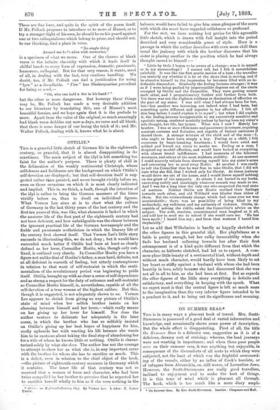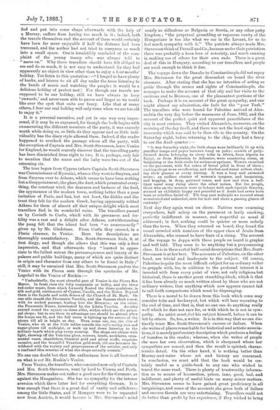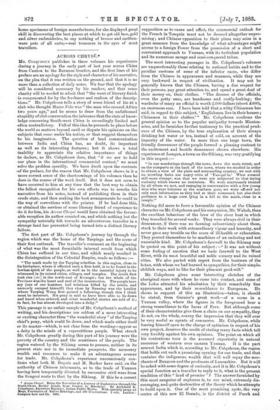ON SUMMER SEAS.*
Tins is in many ways a pleasant book of travel. Mrs. Scott- Stevenson is possessed of a good deal of varied information and knowledge, and occasionally shows some power of description. But the whole effect is disappointing. First of all, the title On Summer Seas is a delusive one, suggestive as it is of a delicious, dreamy sort of cruising ; whereas, the land journeys were not wanting in importance; and when these poor people were on their summer seas, it was anything but enjoyable, in consequence of. the discomforts of all sorts to which they were subjected, not the least of which was the frightful overcrowd- ing of the vessels, either by an influx of Cook's tourists, or of refugees from Alexandria, or, still worse, of Levantine Jews. However, the Scott-Stevensons are really good travellers, inclined to enjoyment and to make the best of things. It is this tone of mind which is pleasant all through. The book, which is too much like a mere diary ampli- • On Samna- Seas. By Mrs. Soott-Sterenson. London : Chapman and HAIL
fled and put into some shape afterwards with the help of a Murray, suffers from having too much in it ; indeed, both the travels themselves and the account of them would certainly have been far more enjoyable if half the distance had been traversed, and the author had not tried to compress so much into a small space. One is irresistibly reminded of the com- plaint of the young tramp who was always told to "move on." Why these travellers should have felt obliged to see and do so much, it is not easy to understand, for they had
apparently no object in view other than to enjoy a four mouths' holiday. Yet listen to this quotation :—" I longed to have plenty of books, and leisure to sit all day under the trees listening to
the bands of music and watching the people; it would be a delicious holiday of perfect rest ! For though our travels are supposed to be our holiday, still we have always to keep onwards,' and never seem able to pause and linger as we would like over the spot that suits our fancy. Like that of many others, I fear our real holiday will only come when we are too old to enjoy it."
It is a personal narrative, and yet in one way very imper- sonal, if it may be so expressed, for though the book begins with enumerating the different members of the party, it was scarcely worth while doing so, so little, do they appear and so little indi- viduality has the diary style allowed them. Indeed, if the reader happened to overlook the passage where all the party, with the exception of Captain and Mrs. Scott-Stevenson, leave Venice for England, he would scarcely discover that the travelling party has been diminished from eight to two. It is, perhaps, only fair to mention that the nurse and the baby were two out of the returning six.
The tour began from Cyprus (where Captain Scott-Stevenson was Commissioner of Kyreuia), whence they went to Smyrna, and from Smyrna over to Athens, which seems to have been nothing but a disappointment ; the glare, the dust, which penetrated every- thing, the constant wind, the dearness and badness of the food, the appearance of the modern town, nothing better than a poor imitation of Paris, and last, but not least, the dislike and dis- trust they felt for the modern Greek, having apparently robbed Athens for them of almost all that unique delight which most travellers find in its wonderful ruins. The travellers passed on by Corinth to Corfu, whicli with its greenness. and fer- tility was a rest and a delight after Athens, notwithstanding the pang felt that the island had been "so unnecessarily" given up by Mr. Gladstone. From Corfn they crossed, in a Florio steamer, to Venice. Here the descriptions are thoroughly unsatisfactory. Mrs. Scott-Stevenson finds, it at first dingy, and though she allows that this was only a first impression, and that afterwards they "learned to appre- ciate to the fullest extent the picturesqueness and beauty of its palaces and public buildings, many of which are quite distinct in origin and character from any others to be found in Italy ;" still, it may be surmised that Mrs. Scott-Stevenson prefers the Venice with its Piazza seen through the spectacles of Mr. Logsdail to the Venice of Ruskin :—
" Undoubtedly, the most cheerful part of Venice is the Piazza San Marco. In front rises the lofty campanile or belfry, and the three red-cedar masts, from which formerly floated the three gonfalons, in silk and gold, emblematic of Cyprus, Candia, and the Mores. Beyond them is the façade and noble domes.of the Church of St. Mark. On one side stands the Procuratie Vecchie, and the famous clock tower, with its arched passage, leading into the Merceria ; on the other, the Procuratie Nueva, terminated by the Libria 'Vecchia. Arcades extend round the square on three sides, within which are the princi- pal shops; but to see them to advantage one should be abroad. after the lamps are lit, and the full moon is lighting up the centre of the piazza till all is bright as day. Then come out, too, the elite of Venice,.who sit at the little tables outside the cafes eating ices and sugar-plums till midnight,' or walk up and down listening to the military bands which play every evening. The shops are ablaze with light, showing off the Venetian glass, mirrors, beads, necklaces, orna- mental vases, chandeliers, Oriental gold and silver stuffs, exquisite mosaics, and the beautiful Venetian gold-work, till one becomes be- wildered with the variety and gorgeousness of the articles, and only a confused idea remains of what the shops actually contain."
No one can doubt but that the enthusiasm here is all bestowed on what is not Mr. Ruskin's Venice.
From Venice, the travellers, who consisted now only of Captain and Mrs. Scott-Stevenson, went by land to Vienna and Pesth. Mrs. Stevenson makes out rather a good case for the Germans, as against the Hungarians. She has no sympathy for the intense aversion which thee latter feel for everything German. It is tame enough that there is a great deal of vanity and selfishness among the little States, and if Hungary were to be separated now from Austria, it would become in Mrs. Stevenson's mind nearly as ridiculous as Bulgaria or SerVia, or any other petty kingdom ; "the perpetual grumbling or vaporous vanity of the Hungarians is too like what we see in the Levant, for us to feel much, sympathy with it." The patriots always made Mrs.
Stevenson think of Parnell and Co., because under their patriotism there was probably a keen love of notoriety, and much cunning in making use of others for their own ends. There is a great deal of this in Hungary, according to our travellers, and people are weak enough to think it fine.
The voyagedown the Danube to Constantinople did not repay Mrs. Stevenson for the great discomfort on board the river steamers. After stating that she has no intention of acting as guide through the scenes and sights of Constantinople, she manages to make the account of that city and her visits to the environs and to Broussa, one of the pleasantest portions of the book. Perhaps it is on account of the great sympathy, and one might almost say admiration, she feels for the "poor Turk."
The travellers who were bound for Palestine arrived at Alex- andria the very day before the massacres of June, 1882, and the account of the perfect quiet and apparent peacefulness of the city is most curious. They visited Alexandria, moreover, on the morning of the day itself, and there was not the least sign of the insecurity which was said to be then rife in the country. On the Saturday night, before returning to the ship, they had a fancy to see the Arab quarter :—
"It was Saturday night, the little shops were brilliantly lit up witb. paraffin° lamps and paper lanterns hung on poles; crowds of gaily- dressed Arabs belonging to every tribe in Africa, from Algeria to. Egypt, or from Abyssinia to Ashantee, were sauntering about, or bargaining at the fruit-stalls for melons or apricots. Women crouched on the pavement, with flat cakes of bread piled in front of them ; cooking-shops were overflowing, and sherbet-and-water sellers clink- ing their glasses at every turning. It was a busy and animated scene ; an endless chatter of women's tongues, and bargaining, rind begging, in deep, guttural tones, and now and then a half- tipsy nasal song rising above the other noises. But the people, those who on the morrow were to behave with such tigerish ferocity, seemed as childishly happy and peaceful as if Arabi had never been born or rebellion heard of. Till long past midnight we rosined about unmolested and unheeded, save for hero and there a passing glance of curiosity."
Next day they again went on shore. Natives were swarming everywhere, half asleep on the pavement or lazily smoking, perfectly indifferent in manner, and respectful as usual if addressed; in fact, nothing could be quieter or more orderly than the town. When they returned on board, they found the vessel crowded with numbers of the upper class of Arabs from Alexandria, who seemed to have fears of a rising. The account of the voyage to Joppa with these people on board is graphic and well told. They seem to be anything but a prepossessing class. It is in these sort of half-social descriptions thatMrs. Scott- Stevenson is at her best. The accounts of Palestine, on the other hand, are trivial and inadequate to the subject. Of course,. Palestine is quite the most difficult subject for an ordinary writer to grapple with, for, in addition to the profound interest it is invested with from every point of view, not only religious but historical, there is another great stumbling-block, which is that it has been already so much written about by those who are not ordinary writers, that anything which now appears cannot fail to call forth comparisons which must be disparaging.
There is a moral to be drawn from this book which some may consider trite and hackneyed, but which will bear repeating to. the end of time, and that is, that no one can do anything really well which he does not care for, or with which he is not in' sym- pathy. An artist must feet his subject himself, before it can be felt by others. So, too, a writer. It is in this way that we can dies tinctly trace Mrs. Scott-Stevenson's success or failure. When she writes of places remarkable for historical and artistic associa- tions, it is merely perfunctory description which produces a feeling- of boredom in the reader ; whereas, when she writes of people she uses her own observation, which is sharpened where her sympathies are roused, and then the result is spirited, charac- teristic detail. On the other hand, it is nothing better than Murray-and-water where art and history are concerned. In conclusion, we must add that the book would be cer- tainly useful as a guide-book to any one who wished to. travel the same road. There is plenty of trustworthy informa- tion as to means of locomotion, prices, inns, good, bad, and indifferent, and plenty of useful hints on many minor matters. Mrs. Stevenson seems to have gained great proficiency in all hargainings, and some of the accounts she gives both of failure and success therein, are very entertaining. Travellers could not do better than profit by her experience, if they wished to bring
home specimens of foreign manufactures, for she displayed great skill in discovering the best places at which to get old lace, gold and silver embroideries, to say nothing of bronze and earthen- ware pots of all sorts,—real treasures in the eyes of most travellers.




































 Previous page
Previous page